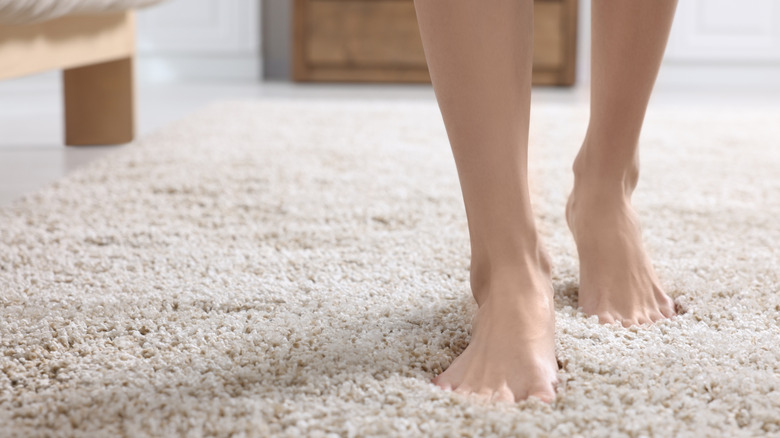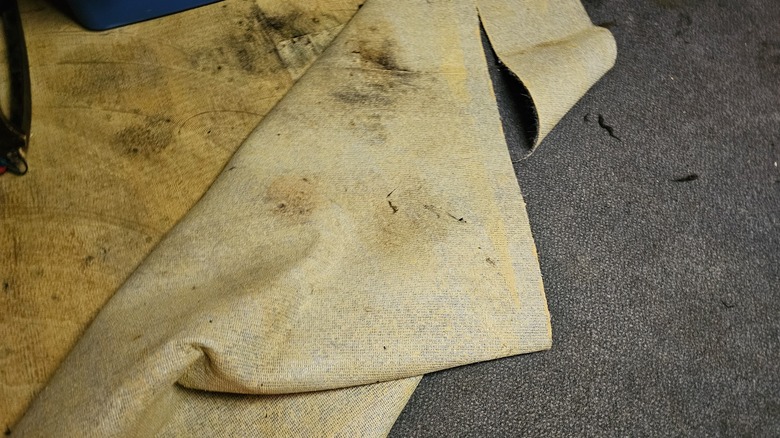Disadvantages Of Installing Carpet You Probably Hadn't Considered
Before the mid-20th century, wall-to-wall carpeting was a luxury reserved for the very wealthy. By the 1950s, carpeting became attainable for middle-class families, and wall-to-wall carpeting became the norm. The '60s and '70s saw carpet's heyday, including the shag carpet craze and — gag — carpet in bathrooms. After that, however, carpet has been on a slow decline.
By the mid-2000s, most homes were limiting carpet to certain room such as bedrooms, playrooms, and dens. According to Floor Covering News, there were around half as many carpet installations in 2022 than in 2012, with carpet now covering around 35% of a home's floors, down from 65% in the previous decade.
Carpet's popularity decline is not only due to changing decor trends, but also a laundry list of practical disadvantages. When compared with other flooring types, such as hardwood, tile, and laminate, carpet requires more maintenance, has a shorter lifespan, and can devalue your home when it comes time to sell. It even comes with environmental and health concerns. There are many facts to consider before installing new carpet in your home.
Carpet's dirty little secrets
One of the most obvious disadvantages of carpet vs. hardwood is stains. A simple spill that could easily wipe off of hard flooring may stick around forever on carpet. Since dark, patterned, and colorful carpets are no longer in vogue, most homes have very light, neutral carpeting where stains have no place to hide. Homes with children and pets are particularly vulnerable, and unless you want to spend your days enforcing strict rules (no shoes, food, drinks, potty-training children, or pets allowed), it will start to look dingy and stained within months. Not to mention smelly. Urine stains and food particles soak into the carpet's fibers, causing lingering smells that are hard to remove. Besides constant spot-cleaning, carpet requires regular vacuuming and occasional deep cleaning, which can be both tedious and expensive.
Stains may have no place to hide, but allergens have plenty. Unseen dust, pet dander, dirt, and other allergens lurk within a carpet's pile. For people with sensitivities, carpet can heighten respiratory issues and allergy attacks. It also harbors dust mites and other small pests, as well as moisture — creating a breeding ground for mold. Mold can grow underneath the carpet, making it impossible to see while wreaking havoc on your family's immune systems.
Finally, carpet has a worse environmental effect than other flooring types. It needs to be replaced more frequently, and its synthetic compounds make it hard to recycle.
Can carpet devalue your home?
You are planning to sell your home and want to replace the dingy, stained carpet in one room. Should you replace it with fresh, new carpet, or opt for hardwood? According to the National Association of Realtors Remodeling Impact Report, installing wood flooring has a 118% ROI (return on investment), one of the best ROI on home improvement projects for interior remodeling, second only to hardwood refinishing. Carpet installation didn't even make the list. Both Zillow and Realtor.com report that buyers prefer homes with hardwood throughout, and will pay more for it.
Although carpet is the cheapest to purchase and install, it lasts significantly shorter than other floors. In a study called the Environmental Impacts of Flooring Alternatives, carpet was estimated to have a lifespan of 11 years (it can be as low as five years in areas with high-traffic use). A decade of use may sound promising, until you discover that hardwood can last up to 100 years, marble tile and terrazzo up to 75 years, and cork and ceramic tile up to 50 years. So even if you are settled into your "forever home," you'll get more value for money if you steer clear of carpet.


